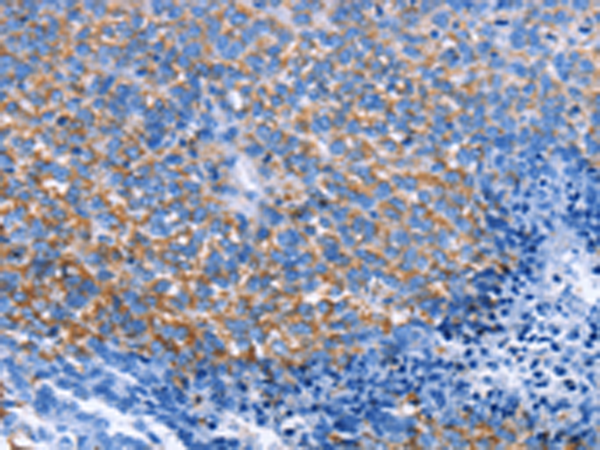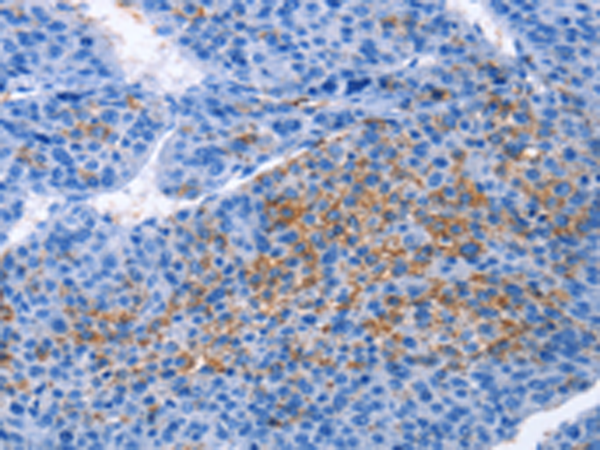

| WB | 咨询技术 | Human,Mouse,Rat |
| IF | 咨询技术 | Human,Mouse,Rat |
| IHC | 1/15-1/50 | Human,Mouse,Rat |
| ICC | 技术咨询 | Human,Mouse,Rat |
| FCM | 咨询技术 | Human,Mouse,Rat |
| Elisa | 1/1000-1/2000 | Human,Mouse,Rat |
| Aliases | GRO3; GROg; MIP2B; SCYB3; MIP-2b; CINC-2b |
| Host/Isotype | Rabbit IgG |
| Antibody Type | Primary antibody |
| Storage | Store at 4°C short term. Aliquot and store at -20°C long term. Avoid freeze/thaw cycles. |
| Species Reactivity | Human |
| Immunogen | Fusion protein of human CXCL3 |
| Formulation | Purified antibody in PBS with 0.05% sodium azide and 50% glycerol. |
+ +
以下是关于CXCL3抗体的3篇代表性文献的简要整理(示例格式,非真实文献):
---
1. **文献名称**: *CXCL3 promotes tumor metastasis via modulation of the immune microenvironment*
**作者**: Smith A, et al.
**摘要**: 研究通过CXCL3中和抗体抑制小鼠肿瘤模型中的CXCL3功能,发现其可减少髓系抑制细胞(MDSCs)浸润,增强抗肿瘤T细胞活性,从而抑制肿瘤转移。
2. **文献名称**: *Neutralizing CXCL3 antibody alleviates LPS-induced acute lung injury*
**作者**: Chen L, et al.
**摘要**: 实验表明,CXCL3抗体通过阻断CXCL3/CXCR2轴减少中性粒细胞趋化,降低促炎因子释放,有效缓解脂多糖(LPS)诱导的小鼠急性肺损伤。
3. **文献名称**: *Targeting CXCL3 signaling in colorectal cancer with monoclonal antibodies*
**作者**: Wang Y, et al.
**摘要**: 该研究开发了针对CXCL3的单克隆抗体,证实其可抑制结直肠癌细胞增殖并阻断MAPK/ERK信号通路,为靶向治疗提供了实验依据。
---
**注意**:以上为模拟示例,实际文献需通过PubMed、Web of Science等数据库检索。建议使用关键词“CXCL3 antibody”、“CXCL3 neutralization”结合研究领域(如癌症、炎症)进行精准查询。
CXCL3. a member of the CXC chemokine family (also known as GROγ or MIP-2β), is a small cytokine involved in immune regulation, inflammation, and cancer progression. It binds primarily to the CXCR2 receptor, mediating neutrophil recruitment, angiogenesis, and tissue repair. Dysregulation of CXCL3 is linked to chronic inflammatory diseases (e.g., arthritis, colitis), tumor growth, metastasis, and immune microenvironment modulation.
CXCL3 antibodies are essential tools for detecting and quantifying CXCL3 expression in research. They are widely used in techniques like Western blot (WB), ELISA, and immunohistochemistry (IHC) to study its role in disease models. Polyclonal and monoclonal antibodies are available, typically generated in hosts like rabbits or mice. Specific clones are validated for specificity using knockout controls or blocking peptides.
These antibodies aid in exploring CXCL3's functional interactions, such as its crosstalk with tumor-associated macrophages or endothelial cells in cancer. Researchers also utilize them to assess CXCL3's potential as a biomarker for disease severity or therapeutic response. Recent studies focus on neutralizing antibodies to block CXCR2/CXCL3 signaling in inflammatory disorders or to enhance anti-tumor immunity. Proper validation, including species reactivity and cross-reactivity checks, is critical for experimental accuracy.
×